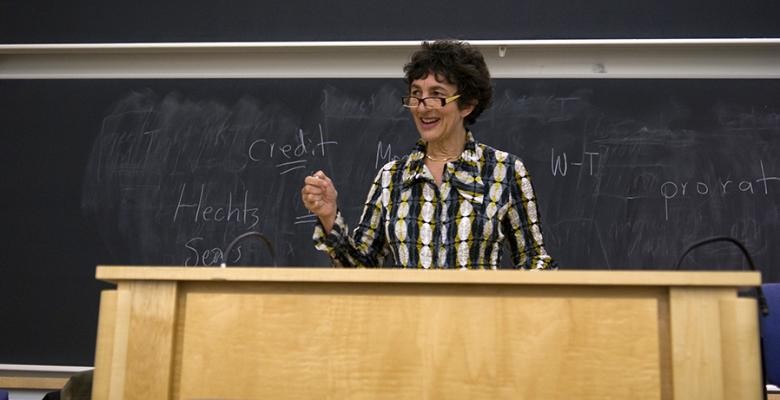5 Questions with Law Prof. Carol Sanger on Abortion Law

Carol Sanger started writing About Abortion: Terminating Pregnancy in Twenty-First-Century America (Harvard University Press) shortly after Barack Obama (CC’83) won the 2008 presidential election. While it was clear to her that individual states would keep trying to limit access to abortion, with a pro-choice president in office “at least the constitutional part would be calm for a while,” she said. “I thought this was the right moment to step up and think harder about why abortion has become so central to political and cultural life in the United States.”
Sanger, the Barbara Aronstein Black Professor of Law at Columbia Law School, teaches family law, contracts, abortion law and other topics that focus on gender and reproduction. She couldn’t have known that her book, published in March, would come out in a vastly different political landscape after the election of Donald Trump, who declared himself anti-abortion five years ago after previously being pro-choice, and Mike Pence, who as governor of Indiana signed some of the strictest abortion laws in the nation.
Said Sanger, “I did not imagine that my book would be quite as topical—and as necessary—as it is now.”
Q. Is abortion settled law?
A. Abortion law is settled in one respect and unsettled in at least two others. In the 1973 case of Roe v. Wade, the Supreme Court held that states could not make abortion criminal because a constitutional right to privacy protected a woman’s right to decide whether or not to become a mother. In 1992, in Planned Parenthood v. Casey, the Court upheld Roe, noting that a whole generation had grown up being able to rely on abortion if contraception failed. The Court also used a doctrine called stare decisis—legal decisions become precedents for future decisions on the same matter; the law is not supposed to change just because the judges change. So abortion is a legal right under the Constitution.
At the same time, the Court in Casey authorized states to regulate abortion from the moment of conception. This meant that states could now go to town enacting regulations of all kinds on abortion patients, providers, and facilities. The result was a regulatory scheme that in some states makes abortion feel criminal even if it isn’t actually a crime.
Q. Abortion is supposed to be a private decision, but you write that it is also something deeper—a secret. What do you mean by that?
A. Women don’t talk about abortion on an individual level. Friends don’t tell friends, mothers don’t tell daughters, women don’t always tell their partners. But if women keep an abortion to themselves because they are frightened of the consequences—stigmatization, loss of relationships—then privacy begins to look more like secrecy. In that way anti-abortion advocates have a lock on the public narrative of what kind of women have abortions and why. It’s easy to stir up anti-abortion feelings because people don’t think anyone close to them is “that kind of woman.” But everyone probably knows someone who has had an abortion, someone they respect.
Q. What is your view on the “personhood” movement?
A. Many pro-life people believe that a fetus is a living human being from the moment of conception. But whatever someone may believe as a matter of faith or personal morality, it doesn’t get to the legal status of a fetus. Philosophers, scientists, and regular people disagree about just when a fertilized egg has the same moral worth as a born person. Most people who think abortion is murder do so for religious reasons, and that terminating an unwanted pregnancy is a sin. Their religious views should not become part of our jurisprudence. We don’t have sins in the Constitution.
Q. Is it discrimination to terminate a pregnancy because the fetus may turn out to be a disabled child?
A. A few states have passed laws making it illegal to get an abortion based solely on fetal disabilities—and also on fetal race or sex—on the pretext that such decisions violate other laws, like the Americans with Disabilities Act. There are many legal problems with this claim, but the main point is that fetuses are not covered by the ADA because they are not legal persons. There is no question that it might be good to change social attitudes about choosing an abortion based on fetal characteristics--a girl fetus, for example. But if we start off by legislating that some reasons for an abortion are good or bad, we get into dangerous territory. A decision to end a pregnancy is always highly contextual. And women know better than legislatures what is best for themselves and for their existing children.
Q. Is there anything coming up that could change abortion law?
A. I think that there will be more activity at the federal level, and foes of legal abortion could propose a personhood amendment to the Constitution. The last three personhood amendments on state ballot initiatives failed. Greater restrictions on contraception education and provision, which will make more abortions necessary, are more likely. The question on everyone’s mind concerns Roe’s vitality. The newest Supreme Court justice, Neil Gorsuch has said that he accepts Roe as the law of the land. One can hope that the respect given to stare decisis in Casey will still count as an important reason not to overturn Roe. The real problem is not what Justice Gorsuch might do but what happens after the next two Supreme Court appointments are made.